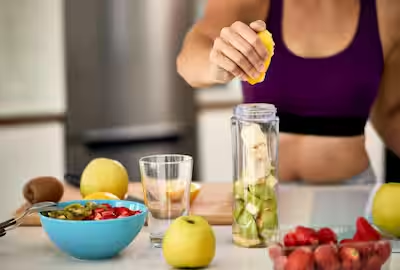A full-body detox is generally described as adhering to a specific diet or using supplements to eliminate toxins, such as pollutants, chemicals, and processed foods, from your body. However, the scientific evidence supporting the effectiveness of many detox products is limited.
In this post, we will debunk common myths surrounding detox diets and provide realistic, research-backed methods to help your body detoxify naturally.
What Is a Full Body Detox?
Detoxification is the process by which your body removes harmful substances and waste. Your liver, kidneys, intestines, lungs, lymphatic system, and skin work together to filter and eliminate toxins.
When these organs are functioning properly, they naturally detoxify the body—no special diet or expensive products are required. However, it is essential to support your body’s natural detoxification systems with healthy lifestyle habits to ensure they function effectively.
How Do You Naturally Detox Your Body?
Instead of depending on expensive detox programs, you can enhance your body’s natural processes by adopting healthy and sustainable lifestyle choices. Here are nine simple, science-based strategies to help your body cleanse and rejuvenate:
1. Eat a Fiber-Rich Diet
Foods that are high in fiber play a crucial role in moving waste through your digestive system, which aids in detoxification. It’s beneficial to include the following in your diet:
-
Whole grains such as brown rice and oats
-
Fresh fruits and vegetables, particularly broccoli, beets, cabbage, and spinach
-
Detox-friendly foods like seaweed, spirulina, chlorella, amla juice, and apple cider vinegar
These ingredients support liver function and assist in the elimination of waste from your body.
2. Limit Alcohol
The liver plays a crucial role in processing alcohol to protect your body from harm. However, excessive drinking can damage liver cells, impair detoxification, and lead to inflammation.
-
-
To support liver health, it is advisable to limit alcohol consumption to one drink per day for women and two drinks per day for men
-
If you don’t currently drink alcohol, there’s no need to start—abstaining from alcohol is always a safe choice.
Supporting your liver involves either drinking responsibly or avoiding alcohol altogether.
3. Prioritize Sleep
Sleep is essential for your body to repair, restore, and eliminate waste products such as beta-amyloid, a compound associated with Alzheimer’s disease. To promote good health, aim for 7 to 9 hours of quality sleep each night.
-
Stick to a regular sleep schedule.
-
Avoid screens and blue light before bedtime.
Poor sleep can weaken your immune system, hinder detoxification, and increase your risk of chronic diseases.
4. Include Detox-Supporting Herbs
Certain herbs and teas can naturally support liver health:
-
Milk thistle, burdock root, and dandelion are known to support the removal of toxins.
-
Green tea is rich in antioxidants that promote overall detoxification.
-
A diet high in fiber enhances the effectiveness of these herbs.
Always consult a healthcare provider before using herbal supplements on a regular basis.
5. Boost Vitamin C Intake
Vitamin C is essential for your liver’s ability to produce glutathione, a vital antioxidant that helps flush out toxins. To ensure you get enough vitamin C, include foods rich in this nutrient, such as oranges, bell peppers, strawberries, and kiwi, in your diet. If you find that your diet is lacking in vitamin C, consider taking supplements, but consult with a healthcare professional first. Additionally, vitamin C helps strengthen your immune system, allowing your body to better defend against illness.
6. Stay Hydrated
Water plays a crucial role in flushing toxins from the body through urine, sweat, and bowel movements. It also provides several other essential benefits, including:
-
Regulating body temperature
-
Cushions joints
-
Aiding digestion and nutrient absorption
Daily water intake goals are as follows:
-
Men: 125 ounces (approximately 3.7 liters)
-
Women: 91 ounces (approximately 2.7 liters)
Tip: To achieve optimal hydration, sip water consistently throughout the day.
7. Cut Back on Salt
Excess sodium can lead to water retention and bloating, which may leave you feeling sluggish. To counteract this, drink plenty of water to help flush out the excess salt. Incorporating potassium-rich foods into your diet, such as bananas, spinach, sweet potatoes, and beans, can also help balance sodium levels
Reducing your salt intake allows your kidneys to maintain proper fluid balance and supports your body’s detoxification processes.
8. Reduce Sugar and Processed Foods
Excess sugar and processed foods can strain the liver and increase your risk of obesity, diabetes, heart disease, and inflammation. To reduce your toxin load and support a healthy metabolism, consider swapping sugary snacks for whole foods like fruits, nuts, and vegetables.
9. Eat Prebiotic Foods for Gut Health
Your gut plays a crucial role in the detoxification process. Prebiotics feed the beneficial bacteria in your digestive tract, which help break down toxins and support your immune system.
Some great sources of prebiotics include:
-
Garlic, onions, and leeks
-
Bananas and asparagus
-
Oats, artichokes, and tomatoes
A balanced gut microbiome enhances digestion and facilitates the removal of harmful substances from the body.
Conclusion
You don’t need expensive detox kits or extreme diets to support your body’s natural detoxification process. By focusing on whole foods, staying well-hydrated, getting enough sleep, and managing stress, you can enhance your body’s ability to cleanse and protect itself.
Making small lifestyle changes consistently can lead to significant improvements in how you feel and function. Pay attention to your body, nourish it with care, and trust its natural detoxification systems to function effectively.

